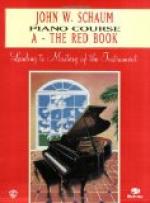We discussed the slow movement at great length. “Note in this movement the slow, dreamy effect that can be made at the ending of the second solo, and the artistic use of the pedal in the following chords. The third movement must have great swing and ‘go’; the octave passage cadenza should be practised in rhythmical groups, and the final Andante must be fast.”
The third time we played the concerto I had it well in hand. Dr. Mason accompanied as only he could do, and at the close praised me on the way I had worked it up, and the poetry and fire I was able to put into it. Who could help playing with fire and enthusiasm when led by such a master!
Dr. Mason was a most inspiring teacher, quick to note and praise what was good, and equally vigilant in correcting what was blameworthy. His criticisms were of the utmost value, for he had such wide experience, and such a large acquaintance with music and musicians. Best of all he was a true artist, always ready to demonstrate his art for the benefit of the pupil, always encouraging, always inspiring.
VITAL POINTS IN PIANO PLAYING
COMPOSITE PRINCIPLES DEDUCED FROM TALKS WITH EMINENT PIANISTS AND TEACHERS
SECTION I
How things are done, how others do them, and the reasons for the doing of them in one way and not in another, used to occupy my thoughts back as far as I can remember. As a child I was fond of watching any one doing fine needlework or beautiful embroidery, and tried to imitate what I saw, going into minutest details. This fondness for exactness and detail, when, applied to piano study, led me to question many things; to wonder why I was told to do thus and so, when other people seemed to do other ways; in fact I began to discover that every one who played the piano played it in a different fashion. Why was there not one way?
One memorable night I was taken to hear Anton Rubinstein. What a marvelous instrument the piano was, to be sure, when its keys were moved by a touch that was at one moment all fire and flame, and the next smooth as velvet or soft and light as thistle-down. What had my home piano in common with this wonder? Why did all the efforts at piano playing I had hitherto listened to sink into oblivion when I heard this master? What was the reason of it all?
More artists of the piano came within my vision, Mehlig, Joseffy, Mason, and others. As I listened to their performances it was brought to me more clearly than ever that each master played the piano in the manner which best suited himself; at the same time each and every player made the instrument utter tones and effects little dreamed of by the ordinary learner. What was the secret? Was it the manner of moving the keys, the size of hand, the length of finger, or the great strength possessed by the player? I had always been taught to play slowly and carefully, so that I should make no mistakes; these great pianists had wonderful fearlessness; Rubinstein at least did not seem to care whether or not he hit a few wrong notes here and there, if he could only secure the speed and effect desired. Whence came his fearless velocity, his tremendous power?




